
The Movie "Koko"
Supporters' Podcast



Main
Old Updates Archive
Links
 |
Lists |
List of Pokemon
Pokemon World Atlas
List of Techniques
List
of Items
List of TV Episodes
 |
Guides |
Episode
Comparisons
Movies
& Specials Guide
CD Guide
DVD Guide
Voice
Actors Guide
Lyrics Archive
Manga Guide
Video Games
 |
Miscellaneous |
Humor
Pokemon Bashing
Features
Rants
Dogasu's
Backpack
| Movies & Specials Guide | Koko
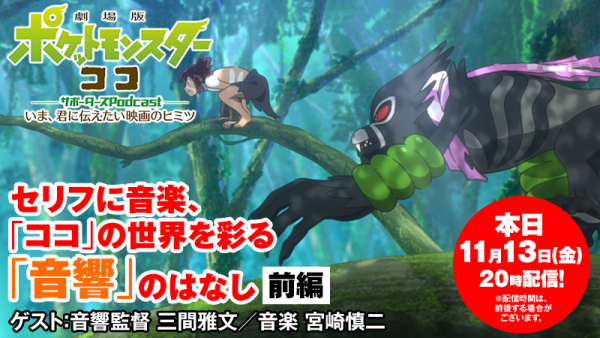
The fifth episode of Pocket Monsters The Movie "Koko" Supporters' Podcast - "The Movie Secrets We Want to Tell You" (劇場版ポ ケットモンスター ココ -サポーターズPodcastーいま、君に伝えたい映画のヒミツ) was released on Friday, November 13th, 2020.
You can listen to the podcast here, though do be aware that the episode is completely in Japanese.
Host: Mr. Hisanori Yoshida (吉田尚記)
Special Guest: The film's sound director, Mr. Masafumi Mima (三間雅文)
Special Guest: Music Composer Mr. Shinji Miyazaki (宮崎慎二)
The podcast host, Mr. Hisanori Yoshida, recalls how when first played Pokémon in college with his then-girlfriend that the two of them would spend all day getting a bunch Koduck and Yadon, over and over and over.
Welcome to the Pocket Monsters The Movie "Koko" Supporters' Podcast - "The Movie Secrets We Want to Tell You"! After the usual explanation of what this podcast is, Mr. Yoshida explains that this episode and the next one will be all about the dialogue, music, and overall sound design of Pocket Monsters The Movie "Koko." The world of animation is way different from the way it was even 20 years ago, he says; these days animation can win awards for things like "Best Animated Picture" but back in the day some of the only recognition the artform would receive at the Academy Awards, for example, was for Best Original Score. So sound is a very important part of animation, in other words.
It's time to introduce today's guests: the sound director for all things Pokémon, Mr. Masafumi Mima, and music composer Mr. Shinji Miyazaki! Mr. Yoshida comments that seeing the two of them sitting the way they are makes this seem like a business podcast but that Mr. Mima's style is a little bit...casual? Mr. Mima admits that he maybe has a bit of a reputation among actors and other sound-related staff for not being the most fashionable guy on the planet but that hey, he still comes across as kind and cheery, right?? Mr. Yoshida tells us that he's wearing a T-shirt and cap and that he looks like he's about to step into a fast food ramen shop for a quick bite to eat.
Mr. Mima's name appears in a ton of animated shows' end credits; Mr. Yoshida figures he probably sees Mr. Mima's name pop up several hundred times in any given year. It also seems like, according to the voice actors who work with him, that Mr. Mima's known for seeming to always be inside a car? He's even part of a Voice Actors Racing Team, apparently, driving around on tracks while wearing a racing suit and everything! Mr. Mima says he's been into racing ever since he worked on Something-Something-D and has been driving recreationally for about 10 years at this point. He shares this hobby with voice actors like Shin-ichiro Miki and Daisuke Namikawa. Mr. Yoshida then mentions that Mr. Mima's been with Pocket Monsters since the very beginning, so nearly 25 years now at this point.
Next, Mr. Yoshida turns his attention to Mr. Shinji Miyazaki. Mr. Miyazaki's also been involved with Pocket Monsters since the very beginning and, in fact, Pokémon is how he came to meet Mr. Mima in the first place. Mr. Miyazaki got the job offer from his company but he didn't know anything about video games - much less this really popular one called Pocket Monsters - so he asked his son what he thought he should do. His response? "You should take it. It's getting really popular now, you know." His son had just entered high school at the time and was playing the video games fervently.
Mr. Miyazaki used the music from the video games as a starting point, so Mr. Yoshida asks if he did the same for the movies. The movies are different, he answers. But for the first TV series, he made a bunch of arrangements of the video game music first, and then Mr. Mima would go well, none of the music that's been made so far really works for this particular scene, for example, so please make X number of original tracks. It ended up being about half and half; half video game arrangements, half Miyazaki-original compositions. Mr. Yoshida mentions that when they were starting out on that first TV series they probably never thought they would go on to make over 20 movies of this thing, and the two guests agree that no, of course they didn't.
And they keep making more! It's at this point in the podcast that Mr. Yoshida announces that both Mr. Mima and Mr. Miyazaki are working on this year's movie as well. Mr. Yoshida mentions that it seems like this is the first time Mr. Miyazaki's involvement in the 23rd film has been publicly announced. "We dragged him back in" says Mr. Mima with a laugh. Mr. Yoshida asks if Mr. Mima was the one who brought Mr. Miyazaki in for the first TV series but Mr. Mima says he wasn't. The casting and production side of things brought in Mr. Mima and Mr. Miyazaki independently and then the two of them met for the first time on the show. When it comes to the movies, it's not really a given that Mr. Miyazaki will work on each and every one so Mr. Mima's always has to be like "ah, so we got Mr. Miyazaki for this year as well, right?" The answer so far has just always worked out to be "yes."
Mr. Mima reckons that doing movie music is really tough. Mr. Mima states that ordering the music in the first place is a huge task, as well as creating the blueprints that decide where certain pieces of music will go throughout the film. He reads the storyboards from the director and decides "OK, we want a piece of music during this scene with Satoshi, from this timestamp to this timestamp" and then makes a note of it in a document he keeps. His job isn't just to plug music into completed scenes, but to figure out the overall sound blueprint of the project.
Mr. Mima's job also involves directing the voice actors in the recording booth. This requires him to be a little bit of an actor himself, in a way; he has to turn to the voice actors and be like "OK, perform the line like this" to help pull great performances out of the artists he has in his studio. Mr. Yoshida compares him to a conductor waving his baton, and while Mr. Mima says that interpretation isn't really wrong, per se, he'd say he's more of an "interpreter" than a "conductor." It's his job to "interpret" ("translate") the thoughts and words of the director, you see. Mr. Mima also states that the actors are all humans, after all, and so everyone has their own unique quirks about them. If you try to give straightforward directions to an actor with a huge sense of pride, for example, he might put up a wall and not deliver the performance you need out of him and so Mr. Mima will use the director's directions as a starting point to convince the actor of what's best for the project.. For actors with low energy, on the other hand, the voice director has to be more like "this is a direct order from the director!" in order to get them to wake up and give it their all.
But what about when he has actors that are just no good? Mr. Yoshida had heard a story from someone working on Pokémon that there was once an actor who didn't know what the hell they were doing and would read every line on their script, stage directions and al. But Mr. Mima says he doesn't remember that at all. Maybe someone just made that up? Mr. Yoshida clarifies that he heard that from Ms. Reina Ueda (Mao's voice actor from the Sun & Moon series). He also heard that this same actor had a crying scene but couldn't really do it well and so he or she read the stage directions that said to cry a certain way and then all of a sudden the actor started crying for real. But the crying was actually a bit too hysterical and so the voice director had to pull the performance back in. Mr. Yoshida reckons the voice director has an interesting job.
The "translating" part of his job, Mr. Mima says, is something he can do because of his age and experience. Mr. Mima had two mentors when he was first starting out. The first was Mr. Susumu Aketagawa (明田川 進), the president of the first place he worked for. Later, Mr. Mima left that company and started working independently. It was during this time he worked with his second mentor, Mr. Shigeharu Shiba (斯波重治), a sound director who had gotten to work on a bunch of Studio Ghibli films in the past. Working under Mr. Shiba, Mr. Mima says, allowed him to see just how much a sound director could make or break the project they were working on.
When Mr. Mima became a freelancer - this was after he left Mr. Aketagawa's company but before he started studying under Mr. Shiba - he called around to about seven different sound production companies to ask if he could come in and shadow them. But he would often get rejected. "Why should we let some random off the street come in to watch us!? What we're working on is confidential you know!" He had already worked on TV professionally at that point so he thought it was maybe OK, but apparently not! Later, he finally got the chance to observe someone, Mr. Shiba, and the person after that, and their attitude was basically like "well, if you can take anything from this then just go ahead and take it." He thought this was a really bold and shocking piece of advice to be given. Mr. Mima later asked if he could become Mr. Shiba's pupil. Mr. Shiba responded he was unfortunately too busy to take anyone in but that Mr. Mima was free to come in and have a look if he wanted. And so that's exactly what Mr. Mima did. All these years later the two of them are still in touch with one another, with Mr. Shiba even coming to visit Mr. Mima's place of work every now and then to observe and offer advice! Mr. Shiba really is a great mentor, huh?
Mr. Shiba is really friendly with the actors. He doesn't just parrot the words of the directors at the actors, but he instead figures out each actors' quirks and finds a way to make what the director wants make sense. Mr. Mima was amazed seeing this approach in action; it really did make a difference in the performances they could pull out of the actors, he noted.
Mr. Yoshida mentions that all the conversations they've had today make it sound like they're talking about stage acting, not animation voiceover work. Does Mr. Mima have experience on the stage? Or did he take a different path to becoming a sound director? Mr. Mima answers that actually he got his start in radio, looking up to radio personalities for inspiration. He was even in a broadcasting study group and had a part-time job at Nippon Cultural Broadcasting and everything! And that was what made him want to be a sound director. He was particularly interested in radio dramas - this was back in the 1980s, when they were still being sold on cassette tapes - and so he worked on those for a number of years, getting himself acquainted with voice and sound effects recording. Because of this love for radio, he says, Mr. Mima was really happy to get the invite to come to this radio-style podcast.
And now these days, Mr. Mima is doing this sound directing job for TV and film - this "interpreting" job. The films' directors have clear ideas of what they want their movie to sound like, he says, and so the director will try to convey that idea by being like "we need a song for Satoshi that'll be bright and cheery." But "bright and cheery" kind of covers a lot of ground, doesn't it? Different people will have a different interpretation of what that'll mean, you know. Should he ask Mr. Miyazaki to make a song where Satoshi is full of energy and ready to run forward? Or should he ask for a more celebratory and happy song? He also has to figure out a way to "translate" those ideas to his musician to get the music the film's director wants. With other shows and other composers, he might play a quick melody on a piano if that show's musician comes from the world of piano, for example. So in that way he's an "interpreter." How can he tailor the directors' message for each person without changing its original meaning?
Sound effects are the same. If a script says "KABOOM!" then what kind of explosion effect should he go for? Anyone can just write the word "KABOOM!" on a piece of paper, but how do you translate into an actual sound effect? Well, if it's an explosion of a building that was ignited by gasoline, for example, then he'll want to mix in the sounds like that of concrete and other debris falling. So, again, he has to "interpret" the directors' wishes in a way that'll make sense to the artists who produce the actual work. His job is to take the director's vision, which he made from scratch, and then translate that into a vivid new world that anyone can see. When do you need a piece of music to start, how long should it last, when should we not have any music at all, etc; everything needs to be worked out, piece by piece.
So Mr. Miyazaki, are Mr. Mima's instructions easy to understand? They are incredibly easy to understand, he answers. Mr. Yoshida then brings attention to the fact that Mr. Miyazaki's holding a piece of paper. Today the music composer's brought with him the music menu for Pocket Monsters The Movie "Everyone's Story," the film that came out two years ago. On the right-hand margins are spaces for the director's (Mr. Tetsuo Yajima) notes while the actual body of the document itself have Mr. Mima's notes to Mr. Miyazaki. But...Mr. Yajima hasn't written anything at all! Mr. Mima explains that the version of the document that Mr. Miyazaki's brought in today probably isn't the final one, and that this version would have likely been reviewed by the film's director at some point later on down the road. Mr. Yoshida guesses that Mr. Mima looks at the storyboards, makes a bunch of notes, and then has those notes reviewed by Mr. Yajima to make sure they're both on the same page. Mr Mima's work is used as the starting point for discussions about how sound is used in the film, though the sound director adds that sometimes the film's director will have an idea to use pre-existing music for certain scenes.
Mr. Yoshida asks if it's OK if he reads excerpts from this document on-air. The movie's already been released so the podcast guests suppose it's alright. This note is from the start of the film:
And here's another one:
Those are just the first two on the page! The document Mr. Miyazaki brought is between 20 and 30 pages and apparently the whole thing is filled to the brim with detailed little instructions like this. Mr. Mima reveals that it takes them about three weeks to create this document, and Mr. Miyazaki adds that ordering music for a movie is probably enough to give you an ulcer, right? Mr. Mima states that his life is so much easier when he doesn't have to order brand new music for a project and can just rely on a library of music instead. For the TV series they'd just order around 50 pieces of multi-purpose music, you see. And even if one song doesn't work out for whatever reason they can always just re-purpose it for some other episode, y'know? For example, they might order a song called "Satoshi's Theme" but then if Mr. Mima feels it maybe doesn't work for some reason - maybe it sounds better for someone not as strong, or someone with less experience - then he can always just save it for another episode. But they don't have the freedom to do that with the theatrical movies. They have to use every piece of music they order for the film and so there's none of that "well, we can just save this for later" thing going on. The movie schedules are so incredibly tight anyway that they simply don't have the time to be redoing music just because their orders weren't clear the first time around. That's why the document Mr. Miyazaki brought in has so many minute details in it.
Mr. Mima also reveals that he has a bit of a traumatic episode in the past regarding ordering music. When he was in his 20s or 30s, he was working with a music team and directed them to make music one way, and then presented this work to the composer for notes. "I really wanted to use a crescendo at this part, and I wanted to make this part really exciting"...things like that. But the music producer wasn't happy. "What the hell are you doing? Is this what you think we're being paid for!?" Mr. Mima learned not to get too carried away when making his music orders and to trust the professionals do to their jobs the way they know how to. It's like how if you go to a cake shop, it's better to trust the judgment of the professional chefs to make a delicious cake than it is to go in there and step on their toes by ordering them to use a certain type of cream, etc.
Mr. Mima and Mr. Miyazaki have been working together for a really, really long time. They're like an old married couple, Mr. Yoshida's heard? It's not like that, laughs Mr. Mima, but they have gotten close over the years. This doesn't really happen much anymore but about ten ago or so one of them would call the other in the middle of the night and be like "Hey, I'm having trouble with this one part; do you have a minute to talk about it?" And so the two of them would go to a diner or Japanese style bar (izakaya) near Mr. Miyazaki's place to talk it out. Mr. Yoshida is kind of shocked by this - why would you have a meeting about sound design in such a noisy place? - but Mr. Miyazaki said those meetings were more about discussing the feelings of each scene rather than the specific sounds to be used. Sometimes Mr. Miyazaki could make the music exactly as ordered, but sometimes he couldn't, so he would call a meeting with Mr. Mima to confirm what he was trying to say with his written comments. It's possible that Mr. Mima isn't quite sure himself? The music they produce is the final product, Mr. Yoshida reasons, and so it's good to get these types of feelings sorted out as early as possible.
But don't they ever go to the studio to have these little chats? Not really, says Mr. Mima. They meet at the studio at the very beginning of a project for the pre-production work, Mr. Miyazaki says, but they usually don't have enough time during these meetings for a Q&A or to clarify specific points. Mr. Mima's not against going to the studio, but he's not exactly chomping at the bit to go, either. He doesn't want to push his own agenda too much - like, for example, when he's ordering music he doesn't write details like which musical instruments to use - "use a timpani for this part" - and instead he leaves those kinds of decisions up to the composers. When he places an order, he says, he wants the composers to provide music that represents their feelings and experiences. Mr. Yoshida is reminded of the "translator" conversation from earlier and asks Mr. Mima if, when he looks at a composer like Mr. Miyazaki, he has an idea of how he'll react to any given request. Mr. Mima responds by saying that Mr. Miyazaki's caught on to his tricks over the years so if he doesn't say what he wants in a straightforward way then Mr. Miyazaki will see right through him. It's better to say "this is wonderful" or "this needs work" than to try to dress it up in any way. That kind of straightforward back-and-forth sounds tough, Mr. Yoshida says, but Mr. Mima says they only really meet once or twice a year so they're fine. If they were doing this all year round, he says, then the strain would maybe make their "marriage" come to an end, he jokingly says.
They're running out of time but there's still so much Mr. Yoshida wants to ask his guests so he'll ask one more question. The setting of each year's movie is different, right? Well, for this year's film, Pocket Monsters The Movie "Koko," everyone's inside a jungle and not, for example, some big city somewhere. So how do they approach the sound design? Well, one of the first things Mr. Mima told the voice actors who play the wild Pokémon - including Koko and Zarude - was "always act as though you're always on high alert, as if you're prepared to just run for it at any given moment." It's because they're all playing the parts of animals out in the wild, you see. So when the actors were in the recording booth he'd have them stand a little hunched over, as if they're bracing themselves, instead of standing straight up with perfect posture. That's one way they're "translating" the director's vision to the actors.
When it comes to Mr. Miyazaki...well, he was told similar things about the overall feeling of the movie, though of course the words that were used were completely different. Mr. Miyazaki's been working with Mr. Mima for more than 20 years now so their style of communication is more or less in sync by this point. But when he heard that Mr. Mima had told the actors to stand a certain way in the recording booth he thought "ah, I'd expect nothing less." Mr. Mima confirms that this is the first movie he's asked his actors to brace themselves as if they're about to run away. Mr. Yoshida asks if Mr. Miyazaki's in the room when actors are recording, and he says that at first he isn't. He's busy off working on the music in parallel, you see.
Mr. Yoshida wanted to ask questions about Pokémon's cries but they're all out of time! So they'll talk about that next week in Episode 6! Mr. Yoshida signs off by telling listeners that Episode 7, which comes out December 4th, and Episode 8, which comes out December 11th, they'll have Satoshi herself, Ms. Rica Matsumoto, and the actor who plays Dr. Zed, Mr. Kou'ichi Yamadera, on the show!
The two podcast guests and its host recite their names and then invite everyone to listen again next week.

The fifth episode of Pocket Monsters The Movie "Koko" Supporters' Podcast - "The Movie Secrets We Want to Tell You" (劇場版ポ ケットモンスター ココ -サポーターズPodcastーいま、君に伝えたい映画のヒミツ) was released on Friday, November 13th, 2020.
You can listen to the podcast here, though do be aware that the episode is completely in Japanese.
| Release / General Information |
| Release Date |
November 13th, 2020 |
| Runtime | 30 minutes, 10 seconds |
| Episode Link |
Listen
to the episode here |
| Cast |
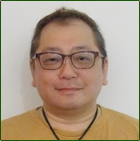 |
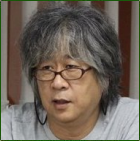 |
Host: Mr. Hisanori Yoshida (吉田尚記)
Special Guest: The film's sound director, Mr. Masafumi Mima (三間雅文)
Special Guest: Music Composer Mr. Shinji Miyazaki (宮崎慎二)
| Episode Five |
The podcast host, Mr. Hisanori Yoshida, recalls how when first played Pokémon in college with his then-girlfriend that the two of them would spend all day getting a bunch Koduck and Yadon, over and over and over.
Welcome to the Pocket Monsters The Movie "Koko" Supporters' Podcast - "The Movie Secrets We Want to Tell You"! After the usual explanation of what this podcast is, Mr. Yoshida explains that this episode and the next one will be all about the dialogue, music, and overall sound design of Pocket Monsters The Movie "Koko." The world of animation is way different from the way it was even 20 years ago, he says; these days animation can win awards for things like "Best Animated Picture" but back in the day some of the only recognition the artform would receive at the Academy Awards, for example, was for Best Original Score. So sound is a very important part of animation, in other words.
It's time to introduce today's guests: the sound director for all things Pokémon, Mr. Masafumi Mima, and music composer Mr. Shinji Miyazaki! Mr. Yoshida comments that seeing the two of them sitting the way they are makes this seem like a business podcast but that Mr. Mima's style is a little bit...casual? Mr. Mima admits that he maybe has a bit of a reputation among actors and other sound-related staff for not being the most fashionable guy on the planet but that hey, he still comes across as kind and cheery, right?? Mr. Yoshida tells us that he's wearing a T-shirt and cap and that he looks like he's about to step into a fast food ramen shop for a quick bite to eat.
Mr. Mima's name appears in a ton of animated shows' end credits; Mr. Yoshida figures he probably sees Mr. Mima's name pop up several hundred times in any given year. It also seems like, according to the voice actors who work with him, that Mr. Mima's known for seeming to always be inside a car? He's even part of a Voice Actors Racing Team, apparently, driving around on tracks while wearing a racing suit and everything! Mr. Mima says he's been into racing ever since he worked on Something-Something-D and has been driving recreationally for about 10 years at this point. He shares this hobby with voice actors like Shin-ichiro Miki and Daisuke Namikawa. Mr. Yoshida then mentions that Mr. Mima's been with Pocket Monsters since the very beginning, so nearly 25 years now at this point.
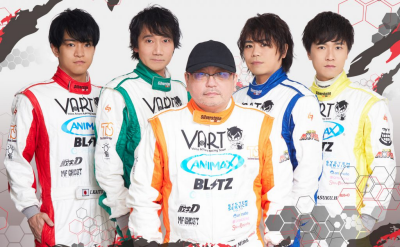
|
| The Voice Actors
Racing Team, of which Mr. Mima (center) is a part. |
Next, Mr. Yoshida turns his attention to Mr. Shinji Miyazaki. Mr. Miyazaki's also been involved with Pocket Monsters since the very beginning and, in fact, Pokémon is how he came to meet Mr. Mima in the first place. Mr. Miyazaki got the job offer from his company but he didn't know anything about video games - much less this really popular one called Pocket Monsters - so he asked his son what he thought he should do. His response? "You should take it. It's getting really popular now, you know." His son had just entered high school at the time and was playing the video games fervently.
Mr. Miyazaki used the music from the video games as a starting point, so Mr. Yoshida asks if he did the same for the movies. The movies are different, he answers. But for the first TV series, he made a bunch of arrangements of the video game music first, and then Mr. Mima would go well, none of the music that's been made so far really works for this particular scene, for example, so please make X number of original tracks. It ended up being about half and half; half video game arrangements, half Miyazaki-original compositions. Mr. Yoshida mentions that when they were starting out on that first TV series they probably never thought they would go on to make over 20 movies of this thing, and the two guests agree that no, of course they didn't.
And they keep making more! It's at this point in the podcast that Mr. Yoshida announces that both Mr. Mima and Mr. Miyazaki are working on this year's movie as well. Mr. Yoshida mentions that it seems like this is the first time Mr. Miyazaki's involvement in the 23rd film has been publicly announced. "We dragged him back in" says Mr. Mima with a laugh. Mr. Yoshida asks if Mr. Mima was the one who brought Mr. Miyazaki in for the first TV series but Mr. Mima says he wasn't. The casting and production side of things brought in Mr. Mima and Mr. Miyazaki independently and then the two of them met for the first time on the show. When it comes to the movies, it's not really a given that Mr. Miyazaki will work on each and every one so Mr. Mima's always has to be like "ah, so we got Mr. Miyazaki for this year as well, right?" The answer so far has just always worked out to be "yes."
 |
| Mr. Miyazaki's name
was added to the credits on the official website on November 15th,
2020, two days after this podcast was released. |
Mr. Mima reckons that doing movie music is really tough. Mr. Mima states that ordering the music in the first place is a huge task, as well as creating the blueprints that decide where certain pieces of music will go throughout the film. He reads the storyboards from the director and decides "OK, we want a piece of music during this scene with Satoshi, from this timestamp to this timestamp" and then makes a note of it in a document he keeps. His job isn't just to plug music into completed scenes, but to figure out the overall sound blueprint of the project.
Mr. Mima's job also involves directing the voice actors in the recording booth. This requires him to be a little bit of an actor himself, in a way; he has to turn to the voice actors and be like "OK, perform the line like this" to help pull great performances out of the artists he has in his studio. Mr. Yoshida compares him to a conductor waving his baton, and while Mr. Mima says that interpretation isn't really wrong, per se, he'd say he's more of an "interpreter" than a "conductor." It's his job to "interpret" ("translate") the thoughts and words of the director, you see. Mr. Mima also states that the actors are all humans, after all, and so everyone has their own unique quirks about them. If you try to give straightforward directions to an actor with a huge sense of pride, for example, he might put up a wall and not deliver the performance you need out of him and so Mr. Mima will use the director's directions as a starting point to convince the actor of what's best for the project.. For actors with low energy, on the other hand, the voice director has to be more like "this is a direct order from the director!" in order to get them to wake up and give it their all.
But what about when he has actors that are just no good? Mr. Yoshida had heard a story from someone working on Pokémon that there was once an actor who didn't know what the hell they were doing and would read every line on their script, stage directions and al. But Mr. Mima says he doesn't remember that at all. Maybe someone just made that up? Mr. Yoshida clarifies that he heard that from Ms. Reina Ueda (Mao's voice actor from the Sun & Moon series). He also heard that this same actor had a crying scene but couldn't really do it well and so he or she read the stage directions that said to cry a certain way and then all of a sudden the actor started crying for real. But the crying was actually a bit too hysterical and so the voice director had to pull the performance back in. Mr. Yoshida reckons the voice director has an interesting job.
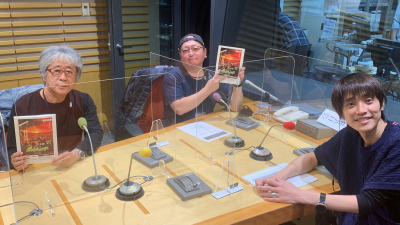 |
| From left to right: Mr. Shinji Miyazaki, Mr. Masafumi Mima, and Mr. Hisanori Yoshida |
The "translating" part of his job, Mr. Mima says, is something he can do because of his age and experience. Mr. Mima had two mentors when he was first starting out. The first was Mr. Susumu Aketagawa (明田川 進), the president of the first place he worked for. Later, Mr. Mima left that company and started working independently. It was during this time he worked with his second mentor, Mr. Shigeharu Shiba (斯波重治), a sound director who had gotten to work on a bunch of Studio Ghibli films in the past. Working under Mr. Shiba, Mr. Mima says, allowed him to see just how much a sound director could make or break the project they were working on.
When Mr. Mima became a freelancer - this was after he left Mr. Aketagawa's company but before he started studying under Mr. Shiba - he called around to about seven different sound production companies to ask if he could come in and shadow them. But he would often get rejected. "Why should we let some random off the street come in to watch us!? What we're working on is confidential you know!" He had already worked on TV professionally at that point so he thought it was maybe OK, but apparently not! Later, he finally got the chance to observe someone, Mr. Shiba, and the person after that, and their attitude was basically like "well, if you can take anything from this then just go ahead and take it." He thought this was a really bold and shocking piece of advice to be given. Mr. Mima later asked if he could become Mr. Shiba's pupil. Mr. Shiba responded he was unfortunately too busy to take anyone in but that Mr. Mima was free to come in and have a look if he wanted. And so that's exactly what Mr. Mima did. All these years later the two of them are still in touch with one another, with Mr. Shiba even coming to visit Mr. Mima's place of work every now and then to observe and offer advice! Mr. Shiba really is a great mentor, huh?
Mr. Shiba is really friendly with the actors. He doesn't just parrot the words of the directors at the actors, but he instead figures out each actors' quirks and finds a way to make what the director wants make sense. Mr. Mima was amazed seeing this approach in action; it really did make a difference in the performances they could pull out of the actors, he noted.
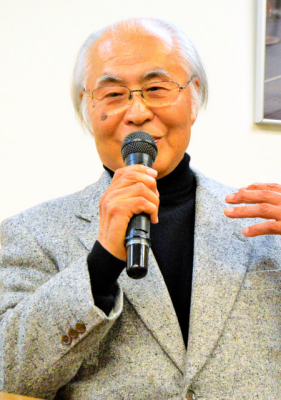 |
| Shigeharu Shiba during
an event in 2017 |
Mr. Yoshida mentions that all the conversations they've had today make it sound like they're talking about stage acting, not animation voiceover work. Does Mr. Mima have experience on the stage? Or did he take a different path to becoming a sound director? Mr. Mima answers that actually he got his start in radio, looking up to radio personalities for inspiration. He was even in a broadcasting study group and had a part-time job at Nippon Cultural Broadcasting and everything! And that was what made him want to be a sound director. He was particularly interested in radio dramas - this was back in the 1980s, when they were still being sold on cassette tapes - and so he worked on those for a number of years, getting himself acquainted with voice and sound effects recording. Because of this love for radio, he says, Mr. Mima was really happy to get the invite to come to this radio-style podcast.
And now these days, Mr. Mima is doing this sound directing job for TV and film - this "interpreting" job. The films' directors have clear ideas of what they want their movie to sound like, he says, and so the director will try to convey that idea by being like "we need a song for Satoshi that'll be bright and cheery." But "bright and cheery" kind of covers a lot of ground, doesn't it? Different people will have a different interpretation of what that'll mean, you know. Should he ask Mr. Miyazaki to make a song where Satoshi is full of energy and ready to run forward? Or should he ask for a more celebratory and happy song? He also has to figure out a way to "translate" those ideas to his musician to get the music the film's director wants. With other shows and other composers, he might play a quick melody on a piano if that show's musician comes from the world of piano, for example. So in that way he's an "interpreter." How can he tailor the directors' message for each person without changing its original meaning?
Sound effects are the same. If a script says "KABOOM!" then what kind of explosion effect should he go for? Anyone can just write the word "KABOOM!" on a piece of paper, but how do you translate into an actual sound effect? Well, if it's an explosion of a building that was ignited by gasoline, for example, then he'll want to mix in the sounds like that of concrete and other debris falling. So, again, he has to "interpret" the directors' wishes in a way that'll make sense to the artists who produce the actual work. His job is to take the director's vision, which he made from scratch, and then translate that into a vivid new world that anyone can see. When do you need a piece of music to start, how long should it last, when should we not have any music at all, etc; everything needs to be worked out, piece by piece.
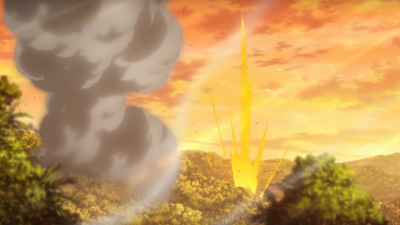
|
| An explosion, as seen
in the Movie 23 trailers |
So Mr. Miyazaki, are Mr. Mima's instructions easy to understand? They are incredibly easy to understand, he answers. Mr. Yoshida then brings attention to the fact that Mr. Miyazaki's holding a piece of paper. Today the music composer's brought with him the music menu for Pocket Monsters The Movie "Everyone's Story," the film that came out two years ago. On the right-hand margins are spaces for the director's (Mr. Tetsuo Yajima) notes while the actual body of the document itself have Mr. Mima's notes to Mr. Miyazaki. But...Mr. Yajima hasn't written anything at all! Mr. Mima explains that the version of the document that Mr. Miyazaki's brought in today probably isn't the final one, and that this version would have likely been reviewed by the film's director at some point later on down the road. Mr. Yoshida guesses that Mr. Mima looks at the storyboards, makes a bunch of notes, and then has those notes reviewed by Mr. Yajima to make sure they're both on the same page. Mr Mima's work is used as the starting point for discussions about how sound is used in the film, though the sound director adds that sometimes the film's director will have an idea to use pre-existing music for certain scenes.
Mr. Yoshida asks if it's OK if he reads excerpts from this document on-air. The movie's already been released so the podcast guests suppose it's alright. This note is from the start of the film:
 |
| We start by panning up as everyone
is
excited for the national holiday ("well, a festival, right?"). The
title has a tentative name of "Fired-Up Courage" and ends (it ends on
Lugia's theme) 駆け上がっ てスタート、人々がそれぞれに国祭 -まぁ、祭り ですね? ー に期待するワクワクさ。タイトル偽名に「盛り上がって勇気」エンド。(ルギアテーマで終わる) |
And here's another one:
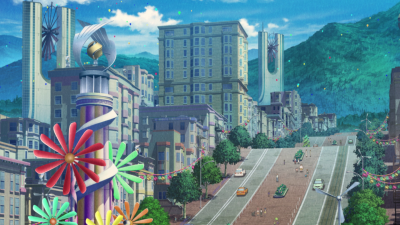 |
| The cut starts with the sounds of a
bell of a cable car going "ring-a-ling" from off-camera ("it goes
"ring-a-ling" from somewhere a little far off-camera"). The scene
description goes on from here so we'll use that journey theme we always
use... カット頭に ケーブルカーの鈴、オフで「チンチン」で - ちょっと遠いところで「チンチン」鳴っている音が-それを受けてスタート。情景描写が次も続くのでここでいつもの旅のテーマで… |
Those are just the first two on the page! The document Mr. Miyazaki brought is between 20 and 30 pages and apparently the whole thing is filled to the brim with detailed little instructions like this. Mr. Mima reveals that it takes them about three weeks to create this document, and Mr. Miyazaki adds that ordering music for a movie is probably enough to give you an ulcer, right? Mr. Mima states that his life is so much easier when he doesn't have to order brand new music for a project and can just rely on a library of music instead. For the TV series they'd just order around 50 pieces of multi-purpose music, you see. And even if one song doesn't work out for whatever reason they can always just re-purpose it for some other episode, y'know? For example, they might order a song called "Satoshi's Theme" but then if Mr. Mima feels it maybe doesn't work for some reason - maybe it sounds better for someone not as strong, or someone with less experience - then he can always just save it for another episode. But they don't have the freedom to do that with the theatrical movies. They have to use every piece of music they order for the film and so there's none of that "well, we can just save this for later" thing going on. The movie schedules are so incredibly tight anyway that they simply don't have the time to be redoing music just because their orders weren't clear the first time around. That's why the document Mr. Miyazaki brought in has so many minute details in it.
Mr. Mima also reveals that he has a bit of a traumatic episode in the past regarding ordering music. When he was in his 20s or 30s, he was working with a music team and directed them to make music one way, and then presented this work to the composer for notes. "I really wanted to use a crescendo at this part, and I wanted to make this part really exciting"...things like that. But the music producer wasn't happy. "What the hell are you doing? Is this what you think we're being paid for!?" Mr. Mima learned not to get too carried away when making his music orders and to trust the professionals do to their jobs the way they know how to. It's like how if you go to a cake shop, it's better to trust the judgment of the professional chefs to make a delicious cake than it is to go in there and step on their toes by ordering them to use a certain type of cream, etc.
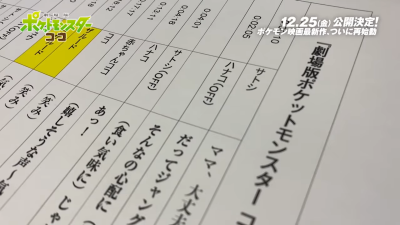 |
| A snapshot of the
script for the film's second trailer |
Mr. Mima and Mr. Miyazaki have been working together for a really, really long time. They're like an old married couple, Mr. Yoshida's heard? It's not like that, laughs Mr. Mima, but they have gotten close over the years. This doesn't really happen much anymore but about ten ago or so one of them would call the other in the middle of the night and be like "Hey, I'm having trouble with this one part; do you have a minute to talk about it?" And so the two of them would go to a diner or Japanese style bar (izakaya) near Mr. Miyazaki's place to talk it out. Mr. Yoshida is kind of shocked by this - why would you have a meeting about sound design in such a noisy place? - but Mr. Miyazaki said those meetings were more about discussing the feelings of each scene rather than the specific sounds to be used. Sometimes Mr. Miyazaki could make the music exactly as ordered, but sometimes he couldn't, so he would call a meeting with Mr. Mima to confirm what he was trying to say with his written comments. It's possible that Mr. Mima isn't quite sure himself? The music they produce is the final product, Mr. Yoshida reasons, and so it's good to get these types of feelings sorted out as early as possible.
But don't they ever go to the studio to have these little chats? Not really, says Mr. Mima. They meet at the studio at the very beginning of a project for the pre-production work, Mr. Miyazaki says, but they usually don't have enough time during these meetings for a Q&A or to clarify specific points. Mr. Mima's not against going to the studio, but he's not exactly chomping at the bit to go, either. He doesn't want to push his own agenda too much - like, for example, when he's ordering music he doesn't write details like which musical instruments to use - "use a timpani for this part" - and instead he leaves those kinds of decisions up to the composers. When he places an order, he says, he wants the composers to provide music that represents their feelings and experiences. Mr. Yoshida is reminded of the "translator" conversation from earlier and asks Mr. Mima if, when he looks at a composer like Mr. Miyazaki, he has an idea of how he'll react to any given request. Mr. Mima responds by saying that Mr. Miyazaki's caught on to his tricks over the years so if he doesn't say what he wants in a straightforward way then Mr. Miyazaki will see right through him. It's better to say "this is wonderful" or "this needs work" than to try to dress it up in any way. That kind of straightforward back-and-forth sounds tough, Mr. Yoshida says, but Mr. Mima says they only really meet once or twice a year so they're fine. If they were doing this all year round, he says, then the strain would maybe make their "marriage" come to an end, he jokingly says.
They're running out of time but there's still so much Mr. Yoshida wants to ask his guests so he'll ask one more question. The setting of each year's movie is different, right? Well, for this year's film, Pocket Monsters The Movie "Koko," everyone's inside a jungle and not, for example, some big city somewhere. So how do they approach the sound design? Well, one of the first things Mr. Mima told the voice actors who play the wild Pokémon - including Koko and Zarude - was "always act as though you're always on high alert, as if you're prepared to just run for it at any given moment." It's because they're all playing the parts of animals out in the wild, you see. So when the actors were in the recording booth he'd have them stand a little hunched over, as if they're bracing themselves, instead of standing straight up with perfect posture. That's one way they're "translating" the director's vision to the actors.
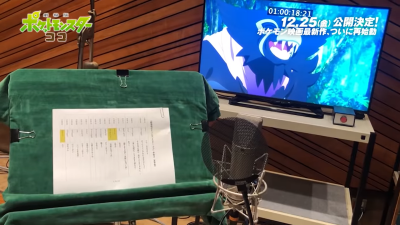 |
When it comes to Mr. Miyazaki...well, he was told similar things about the overall feeling of the movie, though of course the words that were used were completely different. Mr. Miyazaki's been working with Mr. Mima for more than 20 years now so their style of communication is more or less in sync by this point. But when he heard that Mr. Mima had told the actors to stand a certain way in the recording booth he thought "ah, I'd expect nothing less." Mr. Mima confirms that this is the first movie he's asked his actors to brace themselves as if they're about to run away. Mr. Yoshida asks if Mr. Miyazaki's in the room when actors are recording, and he says that at first he isn't. He's busy off working on the music in parallel, you see.
Mr. Yoshida wanted to ask questions about Pokémon's cries but they're all out of time! So they'll talk about that next week in Episode 6! Mr. Yoshida signs off by telling listeners that Episode 7, which comes out December 4th, and Episode 8, which comes out December 11th, they'll have Satoshi herself, Ms. Rica Matsumoto, and the actor who plays Dr. Zed, Mr. Kou'ichi Yamadera, on the show!
The two podcast guests and its host recite their names and then invite everyone to listen again next week.
| Previous
Episode |
Next
Episode |
Back to the page for
Pocket Monsters The Movie "Koko" Supporters' Podcast - "The Movie Secrets We Want to Tell You"
Pocket Monsters The Movie "Koko" Supporters' Podcast - "The Movie Secrets We Want to Tell You"
Found an error? Spot an omission? Please help me keep this page current and error-free by e-mailing me with a description of the error or omission.

